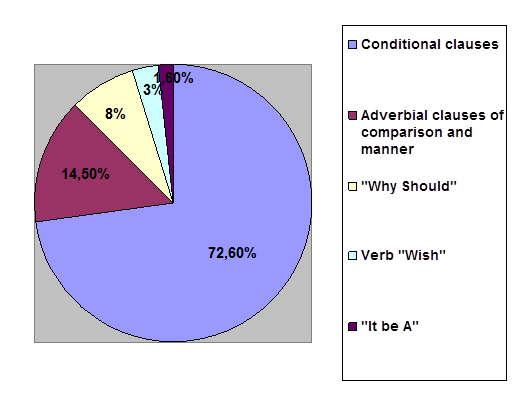Курсовая работа: The problems of the Subjunctive Mood in English
The second place belongs to the quantity of the Subjunctive Mood forms introduced by the conjunction as if /as though in adverbial clauses of comparison and manner, they make 14,5%.
The sentences to express people’s emotions with «why should» occupy the 3d place, they constitute 8%.
The 4th place 3% that is taken by the sentences where the Subjunctive Mood is introduced by the verb «wish» .
And the last (but not least in importance) place – 1,6% belongs to subject clauses inserting the Subjunctive Mood according to the formula:
It be A … .
Graphically I can show it in the following way:
The use of the Subjunctive Mood in the works of English and American authors:

It should be understood that I do not claim that the results obtained by us are embracing all the English and American literature, but I can express an idea that they may be characteristic of it.
The authors can very well do with the Indicative Mood and sometimes Imperative in their creative activities not using supposition, wishes, sorrow and other emotional shades of meaning so much, as I had first expected. May be it is due to the fact that the stories I considered for investigation are based on modern life reality.
It is not necessary to say that our contemporary life is deprived of that romantic touch of sentimentality which can be expressed with the help of the Subjunctive Mood. But I do hope that the forms of the Subjunctive Mood which I discovered in the works of modern English and American writers will be of interest to our students.
As far as my interest of this diploma paper is concerned I am guided by the words of Pascal who said: «People are generally better persuaded by the reasons which they themselves have discovered than by those which have come into the minds of others».
Bibliography
1. Е.А. Корнеева «Пособие по морфологии английского языка» Москва, «Высшая школа» 1974
2. Л.Л. Иофик, Л.П. Чахоян «Хрестоматия по теоретической грамматике английского языка» Санкт – Петербург, «Просвещение» 1972
3. Е.М. Гордон, И.П. Крылова «Грамматика современного английского языка» Москва, «Высшая школа» 1974
4. Б.А. Ильиш «Строй современного английского языка» Санкт-Петербург, «Просвещение» 1971
5. В. Каушанская «Грамматика английского языка» Санкт-Петербург, «Просвещение» 1973
6. Л.С. Бархударов «Очерки по морфологии современного английского языка» Москва, «Высшая школа» 1975
7. H. Sweet «A new English grammar» Oxford, 1988
8. G.O. Curme «A Grammar of the English Language» London – New-York, 1931
9. H. Whitehall «Structural Essential of English» New-York, 1956
10. O. Jespersen «The philosophy of Grammar», London, 1935 «A modern English Grammar» (Part IV), Heidelberg, 1931
11. В. Виноградов «Русский язык» Москва, 1947
12. Erick Segal «Love story»
13. M. Drabble «Jerusalem the Golden»
14. M. Dickens «One Pair of Hands»
15. A. Cassidy «Shopping for One»
16. A. Brookner «A Start in Life»